Video: Death of McCartney's '˜second father', Beatles producer George Martin at 90
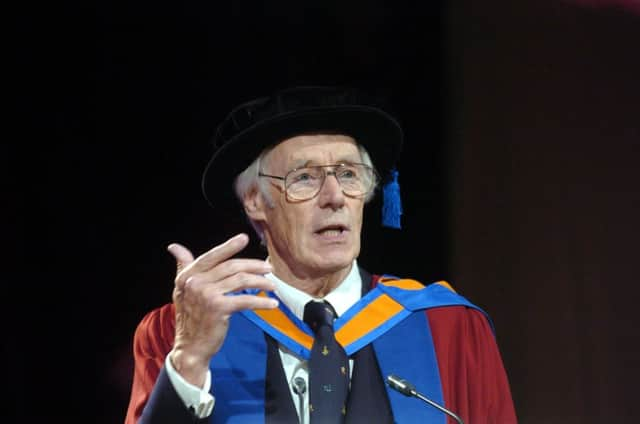

He helped The Beatles achieve global success as the head of the Parlophone record label after hearing their demo tape in 1962.
Sir Paul McCartney led the tributes to Sir George.
In a statement, Sir Paul said: “I have so many wonderful memories of this great man that will be with me forever. He was a true gentleman and like a second father to me.
Advertisement
Hide AdAdvertisement
Hide Ad“He guided the career of The Beatles with such skill and good humour that he became a true friend to me and my family. If anyone earned the title of the Fifth Beatle it was George.”
Sir Paul described Sir George as “the most generous, intelligent and musical person I’ve ever had the pleasure to know” and recalled his favourite memory of the producer, when he persuaded the singer to include strings on The Beatles’ classic hit Yesterday.
“When we recorded the string quartet at Abbey Road, it was so thrilling to know his idea was so correct that I went round telling people about it for weeks,” Sir Paul said.
“His idea obviously worked because the song subsequently became one of the most recorded songs ever with versions by Frank Sinatra, Elvis Presley, Ray Charles, Marvin Gaye and thousands more.
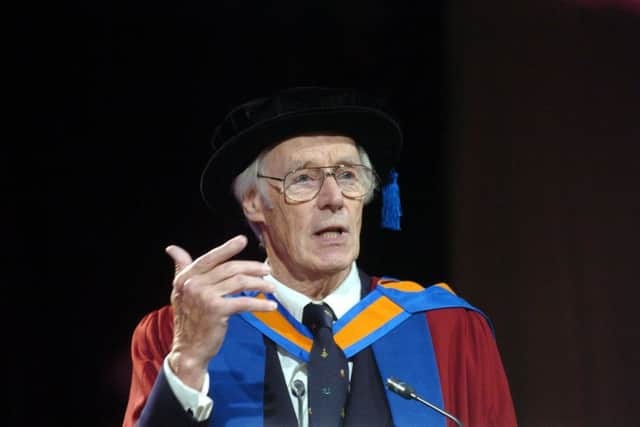

Advertisement
Hide AdAdvertisement
Hide Ad“The world has lost a truly great man who left an indelible mark on my soul and the history of British music. God bless you George and all who sail in you!”
Ringo Starr paid tribute to Sir George for his “love and kindness” to the Fab Four through the years.
The former Beatle tweeted: “God bless George Martin peace and love to Judy and his family love Ringo and Barbara. George will be missed.”
He also posted a picture of the Fab Four and Sir George with the caption: “Thank you for all your love and kindness George peace and love.”
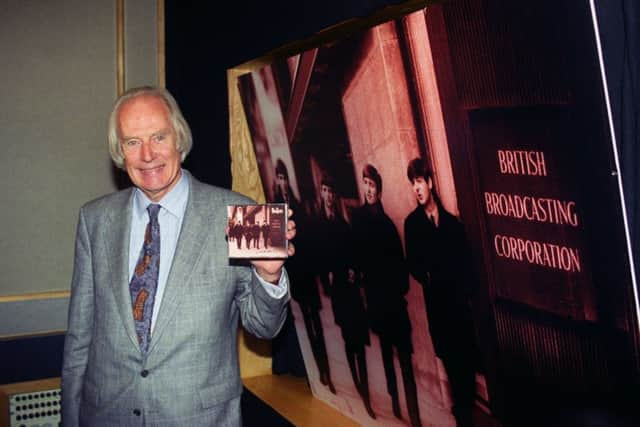

Advertisement
Hide AdAdvertisement
Hide AdSir George’s son Giles, who is also a producer and has worked at Abbey Road studios, wrote: “RIP dad. I love you. I’m so proud to have been your son. I’ll miss you more than words can say. Thank you for the all times we had together.”
Sir George’s manager Adam Sharp described him as “a true gentleman to the end” .
In a statement, he said: “The family would like to thank everyone for their thoughts, prayers and messages of support.
“In a career that spanned seven decades, he was an inspiration to many and is recognised globally as one of music’s most creative talents. He was a true gentleman to the end.”
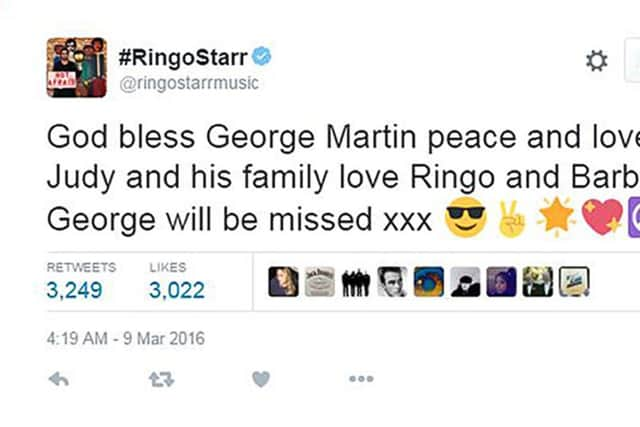

Advertisement
Hide AdAdvertisement
Hide AdSean Ono Lennon, son of John and Yoko, posted a picture of Sir George on Instagram with the caption: “R.I.P. George Martin. I’m so gutted I don’t have many words. Thinking of Judy and Giles and family. Love Always, Sean.”
Prime Minister David Cameron tweeted: “Sir George Martin was a giant of music - working with the Fab Four to create the world’s most enduring pop music.”
Sir George studied at Guildhall School of Music and played the oboe professionally in London before joining the recording industry.
Advertisement
Hide AdAdvertisement
Hide AdDuring his career, which spanned seven decades, he was awarded two Ivor Novello awards, six Grammys and in 2008 was the recipient of the Grammy Foundation’s Leadership Award.
In 1965 he was nominated for an Academy Award for his work on the music in A Hard Day’s Night and in 1984 he received the Brit award for outstanding contribution to music, having been named best British producer at the first Brit awards in 1977.
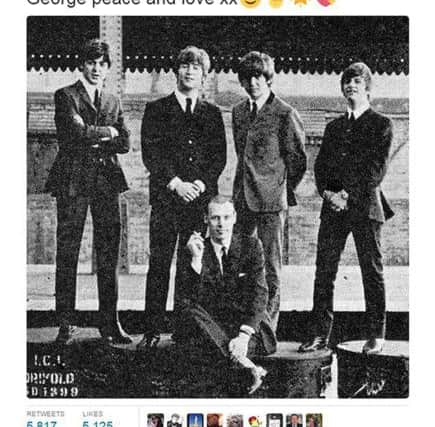

In 2012, the BBC filmed a documentary about his life, Produced By George Martin.
Up until his death, he continued to write music, work with charities and advise broadcasters, according to the website for the independent music publisher he set up in 1969.
Advertisement
Hide AdAdvertisement
Hide AdHis son Giles is also a producer who has worked at Abbey Road studios, where Sir George helped the Beatles perform the world’s first live global broadcast.
Singer Lenny Kravitz wrote on Twitter: “The legends are really going home! Visionary producer of TheBeatles, George Martin (1926-2016).”
It was a long-awaited and fateful encounter which changed popular culture - and the world - forever.
On June 6 1962, The Beatles entered Abbey Road studios - which would become their recording hub for years - for the first time to have their debut meeting with Sir George Martin.
Advertisement
Hide AdAdvertisement
Hide AdNot only did they hit it off, with the band impressed by the dapper record executive’s pedigree as a comedy producer, but they did enough to secure their Parlophone deal. Beatlemania, riches and a musical revolution were to follow.
But for the group it must have felt like the last roll of the dice. They had already been rejected by other EMI-owned labels and their encounter with Sir George had already been three months in the making.
John Lennon, Paul McCartney, George Harrison and then drummer Pete Best had already been stung by rejection after being summoned to London to try out for Decca on the recommendation of a company junior who had seen them at Liverpool’s Cavern Club.
But when the band arrived for their date in the studio on New Year’s Day, they were already jaded from a 10-hour van drive as a result of roadie Neil Aspinall losing his way.
Advertisement
Hide AdAdvertisement
Hide AdThey rattled through 15 songs on their battered equipment, before being hustled out of the West Hampstead studio to make way for an audition by Brian Poole And The Tremeloes.
Although days later the band had the delight of seeing their first record released - playing as the backing band to Tony Sheridan for his version of My Bonnie - the band soon had their bubble burst when Decca rejected a deal in early February.
One of the cited reasons was famously that “guitar groups are on the way out”, but it led the group’s manager Brian Epstein fuming that they would one day “be bigger than Elvis Presley” at a subsequent meeting with executives.
Undeterred, Epstein continued to tout the group, now with his Decca tapes in hand, but faced even more rejection.
Advertisement
Hide AdAdvertisement
Hide AdIt was a visit to the HMV shop in Oxford Street which set their eventual deal in motion.
Epstein called in to see a friend he had made on a retail management course, who suggested his tapes should be transferred to discs - to make it easier to hawk the songs around. The shop engineer was so impressed he called down a music publisher from the top floor office, who in turn, made a call to Sir George’s secretary to recommend a meeting with Epstein.
A few days later on February 13, Epstein visited the record label HQ within EMI’s Manchester Square office in London, at which Sir George heard the disc and spotted some potential and showed interest in meeting the band.
All went quiet for three months until manager and exec met again and unusually a contract was drawn up before even meeting the band, apparently to make the process quicker if he gave a deal the go-ahead at a later audition.
Advertisement
Hide AdAdvertisement
Hide AdWhen the eventual session at Abbey Road took place, the band recorded four tracks - Besame Mucho and three original songs, PS I Love You, Love Me Do and Ask Me Why. Sir George had left the session in the hands of assistant Ron Richards but was summoned from the canteen after the deputy was impressed by Love Me Do, and he spent of the remainder of the session on hand.
As they listened back to the tape, their soon-to-be label boss said they had to speak up if there was anything with which they were unhappy, to which Harrison is famously said to have replied: “For a start, I don’t like your tie.”
After the session he thought about whether the line-up needed tinkering to a more conventional single singer format, instead of both McCartney and Lennon sharing duties, eventually opting to leave well alone.
Sir George eventually opted to sign them after deciding he had “nothing to lose”, although the contract left them with a piffling royalty which was heavily weighted in favour of enriching the label rather than the band, which in later years left them embittered and much more protective of their output.
Advertisement
Hide AdAdvertisement
Hide AdBy September 4, joined by a new drummer Ringo Starr, they were back at Abbey Road to record their first single Love Me Do (although Starr was actually replaced by session man Alan White for the track).
He will long be remembered for nurturing and shaping The Beatles, but Sir George Martin also had a pivotal role working with many comedy greats.
He was behind a string of humorous records and novelty hits which went on to enjoy a long shelf-life on light entertainment shows.
Sir George produced recordings by comic legends such as Spike Milligan and Peter Sellers as well as notable songs such as Right Said Fred by Bernard Cribbins and Jake The Peg by Rolf Harris.
Advertisement
Hide AdAdvertisement
Hide AdAfter leaving music college, Sir George worked at the BBC music library before moving on to become assistant to Oscar Preuss, the head of Parlophone Records, an offshoot of EMI which specialised in classical works, jazz, light songs and comedy.
Five years later, in 1955, he became head of the label but continued with his A&R work and producing a wide range of sessions. He worked on an album with music hall duo Flanders & Swann, and did a recording of Beyond The Fringe, the revue which famously led to the success of Peter Cook and Dudley Moore.
Further comedy recordings took place with Sellers, including his single Goodness Gracious Me, and a session with his radio troupe The Goons led to the album Bridge On The River Wye, from which a friendship with Milligan was formed.
Other offbeat recordings included The Hippopotamus Song with baritone and broadcaster Ian Wallace and Charlie Drake’s My Boomerang Won’t Come Back. He virtually cornered the market with his string of novelty tunes, many of which went on to become fixtures on weekly children’s radio series Junior Choice, with Nellie The Elephant by Mandy Miller and Terry Scott’s My Brother.
Advertisement
Hide AdAdvertisement
Hide AdBut aside from the mirth, Sir George also worked with many other stars of the era including jazz greats such as Cleo Lane, Johnny Dankworth and Stan Getz, as well as The Temperance Seven - featuring John Barry - and Matt Monro.
Different strands of Sir George’s career occasionally came together. He produced Sellers once again when the comedy actor recorded his spoof of The Beatles hit Hard Day’s Night in a mock Richard III style.
He also worked on Cribbins’ cover of The Fab Four’s When I’m Sixty Four.